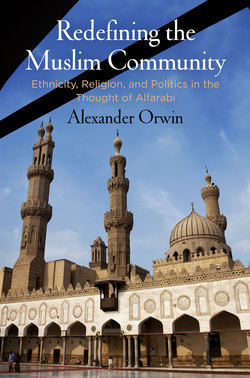Redefining the Muslim Community

Реклама. ООО «ЛитРес», ИНН: 7719571260.
Оглавление
Alexander Orwin. Redefining the Muslim Community
Отрывок из книги
Redefining the Muslim Community
Ethnicity, Religion, and Politics in the Thought of Alfarabi
.....
In the subsequent discussion, Socrates does reintroduce “the laws and practices that we have gone through” in the first half of the dialogue (502b6–7). But the absence of the city for which these laws were initially intended means that they have been detached from their original context and integrated into a program of legislative reform for a preexisting city that has been rendered obedient to philosopher rulers (502b4–5). The old approach was based on “beholding a city coming to be in speech” (369a5–6), while the new approach is based on philosophers designing a divine model and striving to implement it in existing cities (500e1–3). It now seems that the city was never meant to be founded in deed, but rather elaborated in speech, so that it may serve as a model for the drastic reforms that philosophers will impose once they have taken over existing cities. When Socrates and Glaucon return as founders, their primary task is no longer to design legislation for a new city, but rather to compel the philosophers to concern themselves with government in general (519c8ff.).
The philosopher kings, once they have been compelled to rule, would not be content with existing norms. They would have to purify the city and the ways of its inhabitants, like a tablet that an eraser has returned to a state of pristine blankness. Only then can they initiate the desired reforms (501a2–c2). The precise meaning of this purification appears in graphic terms at the end of Book VII, with its ludicrous proposal for the expulsion of all the inhabitants over ten years of age, once “the true philosophers, either one or many, come to power in a city” (540d3–4, italics mine). The sweeping expulsion of the parents followed by the sound education of the children along the lines elaborated in the first half of the dialogue is the only way a city in any nation (ethnos) could become truly happy (541a5–6). Socrates’s rare mention of the ethnos here is highly significant. By noting that such an expulsion would be equally necessary in any ethnos, Socrates indicates how completely the customs of every nation are likely to resist the establishment of his city. The notion that a city rooted in parricide and the destruction of ancestral customs could somehow “profit the nation in which it arises” (541a6–7) is absurd: it recalls and generalizes Socrates’s earlier assertion that the city that had just abolished the family and introduced women into the army could reconcile warring Greeks (471a6–7). The broadening of the dialogue’s concern from a city to the nation to which the city belongs serves to reiterate the practical impossibility of the city. Glaucon was induced to call the city Greek; Socrates eventually consigned it to some remote barbarian place; now it has become equally anathema to the ways of every nation on earth. Socrates eventually confirms that this city is a model existing only in heaven and in the minds of the humans who contemplate it (592a10–b4). Since no founder of an earthly city would have the luxury of flouting the ways of the nation in which the city comes to be (cf. 541a6–7), it is only as a founder of a heavenly city that Socrates can afford to abstract from merely “ethnic” considerations.26
.....